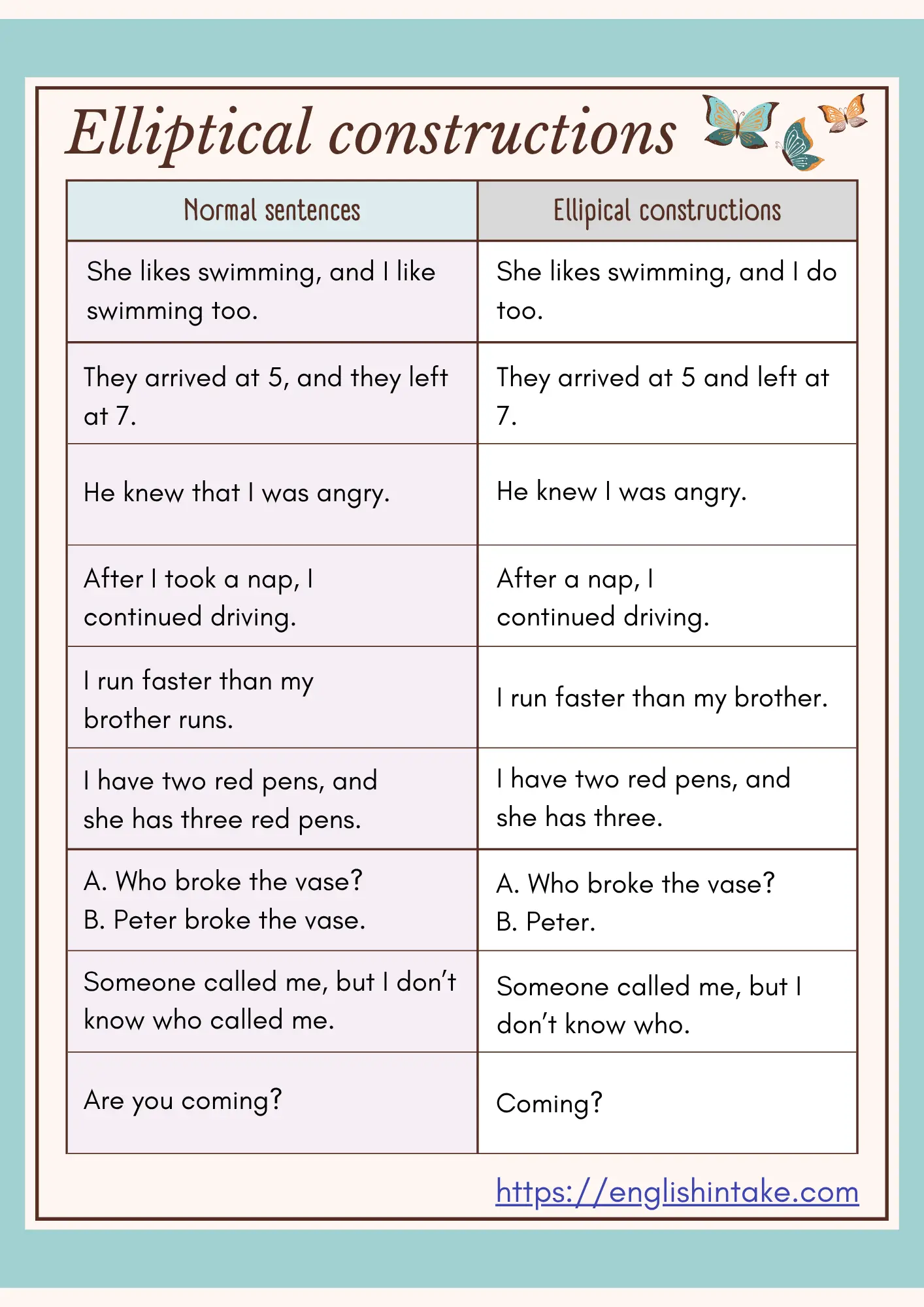1. Elliptical constructions or ellipses
Elliptical constructions or ellipses allow us to omit repetitive words in a sentence when the meaning remains clear. They make speech and writing more concise and natural. In this lesson, we will look at three common types of elliptical constructions in English.

2. Verb ellipsis
When the same verb is reused in a sentence, we can drop it to avoid repetition.
| Full sentences | Elliptical sentences |
|---|---|
| John can play the piano, and Mary can play the piano too. | John can play the piano, and Mary can too. |
| She likes coffee, and I like coffee too. | She likes coffee, and I do too. |
| We will go to Paris, and they might go to Paris as well. | We will go to Paris, and they might as well. |
| I have finished my homework, but she hasn’t finished her homework yet. | I have finished my homework, but she hasn’t yet. |
| They won the game, and we won the game too. | They won the game, and so did we. |
| You must leave now, and they must leave now too. | You must leave now, and they must too. |
| Jack has four cars; William has 2 cars. | Jack has four cars; William, two. |
Use words like too, as well, yet, or auxiliary verbs (do, does, did) to signal the omission.
3. Omitting subjects with conjunctions
When the subject is the same in two clauses joined by 'and', 'but', or 'or', we can drop the repeated subject.
| Full sentences | Elliptical sentences |
|---|---|
| She opened the door, and she turned on the light. | She opened the door and turned on the light. |
| He cooked dinner but he forgot the dessert. | He cooked dinner but forgot the dessert. |
| They went to the park and they played soccer. | They went to the park and played soccer. |
| I’ll call you tonight or I’ll text you tomorrow. | I’ll call you tonight or text you tomorrow. |
| We can watch a movie or we can go for a walk. | We can watch a movie or go for a walk. |
| She smiled, and she waved goodbye. | She smiled and waved goodbye. |
| He washed the car, but he didn’t clean the windows. | He washed the car but didn’t clean the windows. |
| They studied all night, but they still failed the test. | They studied all night but still failed the test. |
| I’ll buy the tickets, and I’ll book the hotel. | I’ll buy the tickets and book the hotel. |
| You can stay here, or you can leave early. | You can stay here or leave early. |
The subject is omitted only if it’s the same in both clauses. Don’t drop it if the subject changes.
4. Omitting words in comparisons
In comparative sentences with than or as…as, we often omit repeated words.
| Full sentences | comparatives using ellipsis |
|---|---|
| My sister is taller than I am tall. | My sister is taller than me. |
| She works as hard as he works. | She works as hard as him. |
| This cake is sweeter than that one is sweet. | This cake is sweeter than that one. |
| I love pizza more than she loves pizza. | I love pizza more than her. |
| He runs faster than his brother runs. | He runs faster than his brother. |
| They have as many books as we have books. | They have as many books as us. |
| She sings better than I sing. | She sings better than me. |
| This movie is less exciting than the book is exciting. | This movie is less exciting than the book. |
| I cook as well as my mom cooks. | I cook as well as my mom. |
| He speaks French more fluently than he speaks Spanish. | He speaks French more fluently than Spanish. |
5. Elliptical expressions with 'either'
When two negative statements are connected with "and ... either", the second clause often omits repeated elements (such as the subject or verb) to avoid redundancy.
| Full sentences | Elliptical expressions |
|---|---|
| I am not hungry, and she is not hungry either. | I’m not hungry, and she isn’t either. |
| He does not play tennis, and they do not play tennis either. | He doesn’t play tennis, and they don’t either. |
| They did not enjoy the movie, and I did not enjoy the movie either. | They didn’t enjoy the movie, and I didn’t either. |
| I will not attend the meeting, and he will not attend the meeting either. | I won’t attend the meeting, and he won’t either. |
| She was not reading a book, and they were not reading a book either. | She wasn’t reading a book, and they weren’t either. |
| My friend is not coming to the party, and I am not coming to the party either. | My friend isn’t coming to the party, and I’m not either. |
| I have not finished my homework, and he has not finished his homework either. | I haven’t finished my homework, and he hasn’t either. |
| They had not cleaned the room, and we had not cleaned the room either. | They hadn’t cleaned the room, and we hadn’t either. |
